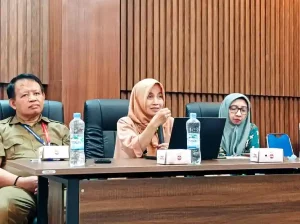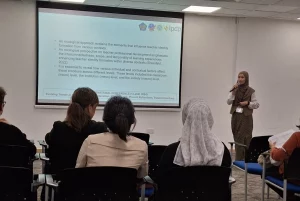COVID-19 cases were rising in Indonesia from 2020 to 2021. The Government keeps implementing human mobility restriction policies to prevent massive infection of COVID-19. However, up till April 25, 2021, the data recorded 44,594 death cases of COVID-19. More than making policies to minimize the human mobility, the government involved the international community to overcome the impact of COVID-19, one of them is the COVID-19 vaccine provision which aims to reduce the spread and death rate due to COVID-19.
Importance of international cooperation
During the pandemic, international cooperation is one of the strategies to counter the impact of COVID-19. Indonesia is no exception. Indonesia needs qualified health facilities to deal with the outbreak. Conducting international cooperation for vaccines aims to reduce the death rate and hospital occupancy rates, apart from receiving the first and second doses of the COVID-19 vaccine for the Indonesian community. The COVID-19 vaccine cooperation has also been carried out by various countries worldwide, such as India, which participated in various international vaccine collaborations. China has also provided 500,000 doses of vaccine for countries in need. Meanwhile, the UK shows the positive impact of vaccination by prioritizing the elderly citizens to be vaccinated for the first dose, at least, which successfully reduced the spread and death rate.
Apart from protecting the community from the Coronavirus, vaccination also improves the quality of the state health system. Health supply crisis and overcapacity hospitals crisis could be prevented for the health system recovery. The new variants of Coronavirus continue to emerge, the vaccine is effective. For instance, double doses of Pfizer-BioNTech are 94 percent effective to cure the Alpha variant and 88 percent for the Delta variant. Various studies have also reported that people who have been fully vaccinated have a lower chance of spreading the virus than those who are not vaccinated.
Vaccine cooperation in Indonesia
Indonesia has done various collaborations to overcome the COVID-19 outbreak. Cooperations with the US and Australia increase the health system performance, such as increasing laboratory capabilities, finding cases of COVID-19, increasing the use of COVID-19 health data records, providing health facilities and equipment, such as ventilators, and so on. So are the Eastern Asia countries like China, Japan, and South Korea which bilaterally aid Indonesia and in ASEAN+3. China has provided 100,000 PCR equipment, 70,000 personal protective equipment, 70,000 N-95 masks, and 1,3 million medical masks for medical supply and to improve Indonesia’s preparedness to deal with COVID-19. China is one of the countries that has helped Indonesia in terms of vaccines. Indonesia received more than a million Sinovac vaccines from China. Indonesia has also bought 3 million doses of the vaccine. The United Arab Emirates has donated 500,000 doses of vaccine, COVAX facility delivered more than 2.5 million doses of vaccine by mid-2021.
In 2021 February, more than 1,5 million people received the first dose of the vaccine. A significant rising trend happened in 2021 March with 6 million people in total. The government of Indonesia gave its best to accelerate the vaccine distribution across the regions. By September, approximately 12 million people were monthly vaccinated, which brought Indonesia to the fifth rank of the most vaccinated countries in October.
The results of the vaccine collaboration of the Indonesian government show that the more people who get the vaccine, the lower the death rate and hospital occupancy rate. The Ministry of Health also stated that the severe cases of COVID-19 were due to not being vaccinated, and the number of health workers affected by COVID-19 requiring hospital treatment dropped significantly from 18 percent to only 3.3 percent. Vaccination can be a parameter to reduce the number of people who need to be hospitalized and minimize the shortages of supplies and health workers.
Author: Fadhila Inas Pratiwi, MA.
More information on this research can be viewed on: https://onlinelibrary.wiley.com/doi/epdf/10.1111/aspp.12643
Pratiwi, F. I., Muttaqien, M., Samy, M., Fadli, J. H., Intan, A. A., & Kusuma, N. R. (2022). International cooperation during COVID-19: Case study vaccine cooperation and its impact in Indonesia. Asian Politics and Policy, 1– 20. https://doi.org/10.1111/aspp.12643









